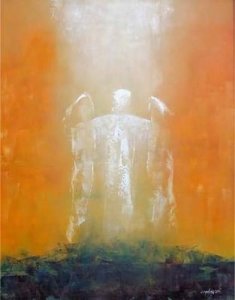On the next day, when they had come down from the mountain, a great crowd met him. And behold, a man from the crowd cried out, “Teacher, I beg you to look at my son, for he is my only child . . .” Luke 9:37-38
Another day, another demon. From the heights of clarity into the thicket of confusion. Mark gives a lot more detail: as Jesus returns from the mountaintop he observes a crowd and a disturbance. There’s an argument going on between scribes and disciples—who, when they see him coming, break off the dispute and run toward him. They’ve attempted a healing and it failed. The argument was probably about authority, and who has it (remember that Jesus had given them authority to cast out demons in 9:1, but this one defies them, giving the scribes an opportunity to say Aha!) So apparently an act of mercy had degenerated to a theological dispute, with this boy and his poor father forgotten in the flying fur.
That may be why the father doesn’t wait his turn to speak, but blurts out an explanation: “A spirit seizes my child, and he suddenly cries out. It convulses him to that he foams at the mouth, and shatters him—and I begged your disciples to cast it out, but they could not–” Imagine his relief, after dealing with ineffectual disciples, to see the Master himself approaching. Now he can finally get some action! But that sense of euphoria comes crashing down—
“Oh unbelieving and rebellious generation! How long must I put up with you?” These are the harshest words Jesus ever said to a layman. Mark indicates that a qualifier from the dad (“If you can do anything”) provokes this outburst.
Does the father deserve this? His only child is getting worse—how many times will the boy be “shattered” by this demon before he falls apart? Hearing that Jesus is nearby, the man packs up his son and hits the road–a daunting prospect in itself, since a major challenge posed by the demon-possessed is keeping them out of sight–only to find the Master is not available! Not to worry, his followers say: He gave power to us; we can cast out demons as well. An excruciating scene follows. One by one, Andrew, Philip, Thomas, Judas—the boy’s father loses track of these names and turns out it doesn’t matter. One by one, they give it a shot: “I command you to come out of him!” But the evil spirit just laughs in their faces, that horrible, growling laugh coming out of his boy, more unnerving than the destructive fits.
The repeated attempts and failures draw attention, and now father and son are subjected to a doctrinal dispute, of which they are the object lesson but no longer the concern. The boy sits in the middle of it all, twitchy and drooling, while his father would like the ground to just open up and swallow them, please. For a moment his heart lifts when he hears the Master is coming. In his eagerness and relief, he stammers out an explanation, and the master explodes. Over three little words: If you can. Really? What did I say, and what’s touched him off, and how can I salvage this mess?
Unbelieving generation—faithless—rebellious—“Don’t you know all things are possible for him who believes?”
At this, the fear and frustration and failure of a hundred unbelieving generations burst out: “I do believe! But please . . . help my unbelief!”
It would be nice to read that Jesus’ heart was moved and he looked on this poor father with compassion. Maybe he did, but we don’t see that; only a curt, “Bring him here.”
The boy was left behind in all the excitement. The demon within him, having enjoyed a very interesting morning, may be taking a break. But as they drag the boy forward, the demon recognizes his worst nightmare and throws one last hurrah, writhing and convulsing at the Master’s feet. One sharp command is all it takes: screeching, the evil presence departs for good. After a long pause the boy sits up, in a crowded silence of unspoken echoes.
If you can—If—I asked them but—can’t do anything—If—If—
Faithless generation! is God’s own cry. Remember the fury of Moses when he came down from his mountain? This is a difference in degree, but not in essence. The same skepticism that prompted a nation of ex-slaves to worship a golden calf is showing up in their descendants: why won’t they (why won’t we) just believe what God says? Jesus has been talking with ancients on the mountain about what awaits him in Jerusalem. That is because of this: the refusal of all generations to believe. Oh yes, they can show faith when it benefits them, when there’s something in it for them. But what will happen to their faith when the miracle worker obviously needs a miracle?
The boys are asking questions: Why? Why couldn’t we cast it out? Because this kind of demon, he patiently (or not-so-patiently) explains, can only be driven out with prayer. Did you pray for power, or just assume you had it? Thought so. News flash: the power is not yours but God’s. Can you remember that in the future?
Listen: things are going to get very complicated. In fact, the Son of Man will soon be betrayed by sinners like you and delivered to the mercy of other sinners. Get it?
No. They did not understand. It was hidden from them. They couldn’t grasp it (9:45).
Oh, faithless generation! If there was any other way to fix you, I would do it, but the very best among you is a child, driven by self-interest and operating on instinct. I could drive out demons all day and still be left with unbelieving hearts. What you need is a new heart: like a child’s in the best way, completely believing and trusting. We can do that, but if you only knew the cost . . .
“Teacher, which of us is the greatest?”
________________________________
For the original post in this series, go here.
Next>




